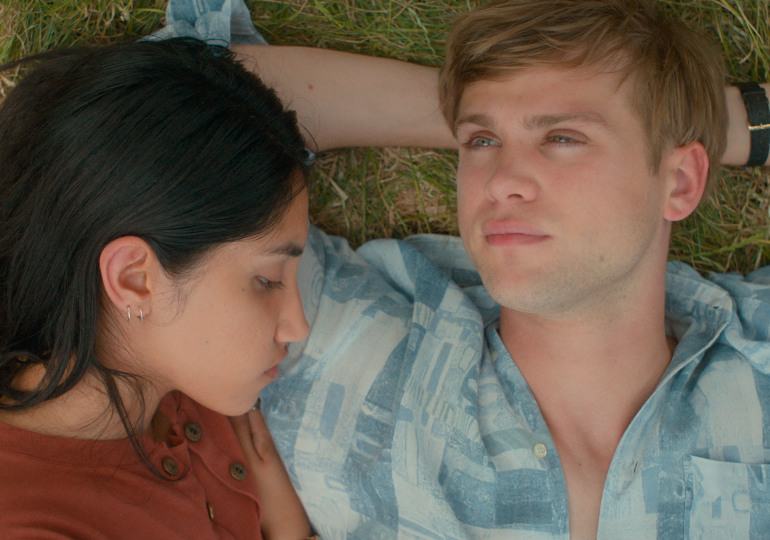Warning: This post contains spoilers for Netflix’s One Day.
Just in time for Valentine’s Day, Netflix has a new romance series that’s guaranteed to break your heart.
One Day, out Feb. 8 and based on David Nicholls’ best-selling 2009 novel of the same name, traces the will-they-won’t-they relationship of Emma Morley (Ambika Mod) and Dexter Mayhew (Leo Woodall) over the course of more than a decade. Opening in Edinburgh on July 15, 1988, known in the U.K. as St. Swithin’s Day, Em and Dex meet for the first time on the night of their college graduation. Despite their many differences—studious, working-class Emma is an aspiring writer who wants to change the world while big-man-on-campus Dexter is a privileged, posh school boy with no real plans for the future—a botched one-night stand leads to a friendship that hovers ever on the edge of turning into something more.
[time-brightcove not-tgx=”true”]
One Day was previously adapted (from a script by Nicholls) into a 2011 film starring Anne Hathaway and Jim Sturgess that received some pretty scathing reviews. The Boston Globe’s Ty Burr described the feature as, “a miscast, underwritten, drably directed adaptation of a very popular novel…the feel-bad film of the summer and an almost perfect example of how not to turn a book into a movie.”
But things are different now, according to Nicholls, who told Esquire that the miniseries format is a better fit for a more compelling and nuanced retelling of his source material. While Nicholls is an executive producer on the show, this time around, series creator Nicole Taylor (Wild Rose) served as lead writer.
“In the film, the chapters, the days, become story beats that are part of a larger arc: links in the chain,” Nicholls said. “In a series, each chapter, each day is a story in itself, with a beginning, middle and an end. [It often has] its own style and tone; a solo piece, a romantic comedy, a darker drama, a farce. Which is a terrific freedom for the screenwriters.”
Read more: Netflix Romance One Day Is an Irresistible Emotional Roller Coaster
What is One Day about?
Each of the series’ first 12 episodes revisits Emma and Dexter—sometimes together, sometimes apart—on every subsequent July 15th from their first meeting in 1988 through 1999, tracing the ups and downs of their relationship against the backdrop of their personal successes, failures, and heartbreaks.
“The premise of the novel was it should be like looking through a photograph album in the way that a photograph snatches a moment in time, that these days are little vignettes of how you were at that time,” Nicholls told Entertainment Weekly. “So that was very much the intention with the show, that they would age.”
Extenuating circumstances and a healthy dose of self-sabotage keep the pair from making it work. That is, until Dexter—fresh off a divorce from his unfaithful first wife Sylvie (Eleanor Tomlinson), the mother of his daughter Jasmine (Billie Gadsdon)—visits Emma in Paris to declare his feelings for her. She’s met someone new and thinks she’s “finally got rid of” Dexter. “I don’t think you can,” he tells her after an emotional reconciliation at her apartment in the wake of his confession.
How does One Day end?
The stars have aligned and Em and Dex are together at long last. In the penultimate episode, we watch them grow closer and flourish both individually and as a couple as the next two July 15ths pass. Then, a little less than a year into their marriage, on July 15, 2002, the two are trying (so far unsuccessfully) to have a baby of their own when Emma is unceremoniously hit and killed by a reckless driver while biking through London to see a house she and Dexter are considering buying.
The series finale jumps ahead to 2003 and 2004 as a floundering Dexter resorts to his old substance-abuse habits in a self-destructive attempt to cope with his grief. Five years after the accident, in 2007, Dexter ultimately seems to come to terms with Emma’s death as he reminisces on their earliest memories together while visiting Edinburgh with Jasmine.
But…why?
The series’ final two episodes make for a devastating ending that’s likely to leave you feeling like the rug’s been ripped out from under you. That’s because they’re largely faithful to the book.
Since its 2009 debut, Nicholls’ novel has been translated into 40 languages and sold more than six million copies worldwide. It’s a megahit, but one whose tearjerking conclusion has stoked a good bit of criticism.
Following the release of the 2011 movie, Willa Paskin wrote for Vulture, “One Day’s last-minute death, which is also part of the 2009 novel and is just as sudden and aggravating there, isn’t an organic twist, it’s a brazen play for the higher-brow…It’s not in keeping with the mood, which has been, up until then, a thinking-person’s romantic comedy.”
At the time, Lone Scherfig, who directed the film, said that it “wouldn’t be a good story if it hadn’t taken a very unexpected direction,” while Nicholls defended the twist—apparently inspired by a passage in Thomas Hardy’s Tess of the D’Urbervilles—as keeping One Day from just being a “‘will they or won’t they’ story of best friends who could be something more…the oldest story there is.”
As of its premiere, Netflix’s One Day has earned generally favorable reviews from critics, notching a score of 78 on Metacritic and a 94% on Rotten Tomatoes. Still, the story’s final act is a point of contention amid the praise.
“The ending, which doesn’t quite earn its abruptness and, worse, frames one character primarily as a vehicle for the other’s development, remains a problem,” wrote TIME’s Judy Berman. “But everything that leads up to it, from all the witty banter to the empathy the show extends even to jealous boyfriends and angry exes, is enjoyable enough that the finale detracts less than you’d think from the overall experience.”
Leave a comment








